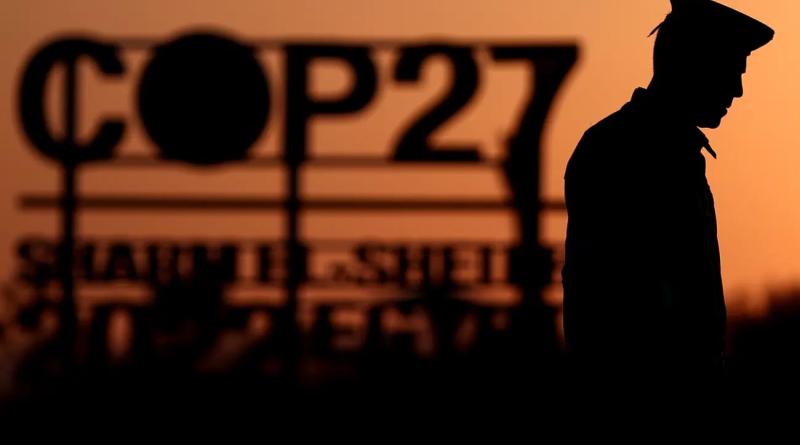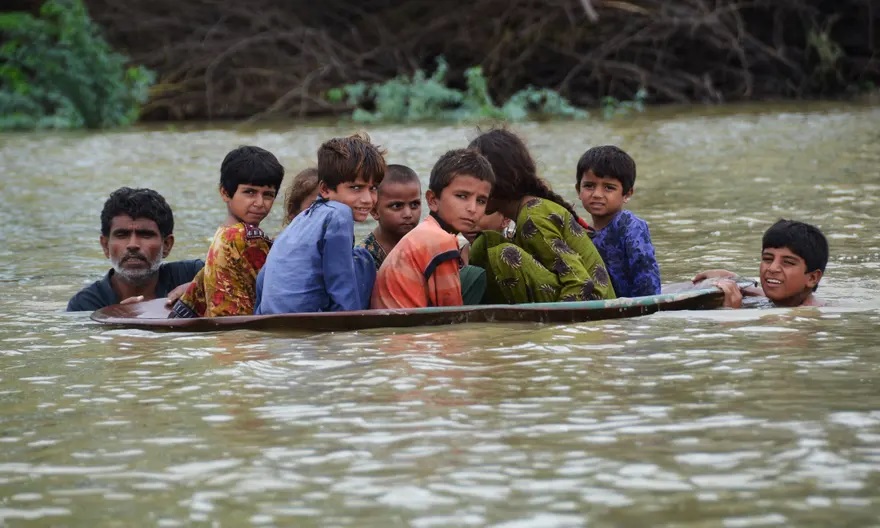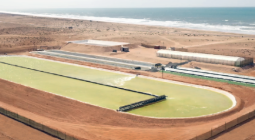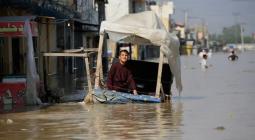A deal on loss and damage, but a blow to 1.5C – what will be Cop27’s legacy?

Anger at western hypocrisy heated to boiling point in Sharm el-Sheikh, but after intense talks the impasse was finally broken
On the eve of the Cop27 climate conference that has just finished in Sharm el-Sheikh, the UN secretary general, António Guterres, warned of the stark consequences of failure.
“There is no way we can avoid a catastrophic situation, if the two [the developed and developing world] are not able to establish a historic pact,” he said, in an interview with the Guardian. “Because at the present level, we will be doomed.”
In the end, after two weeks of fraught and often bitter negotiations, the “historic pact” Guterres wanted was finally struck. For the first time in 30 years of climate talks, developed countries agreed to provide finance to help rescue and rebuild poorer countries stricken by climate-related disasters, known as a loss and damage fund.
“Cop27 has done what no other Cop has achieved,” said a jubilant Mohamed Adow, director of the thinktank Power Shift Africa. “This has been something which vulnerable countries have been calling for since the 1992 Rio Earth Summit. To quote the Three Lions England football song, after 30 years of hurt, climate action is finally coming home on African soil here in Egypt.”
It very nearly did not happen. The deal – formally gavelled through soon after 9am on Sunday after a marathon negotiating session running 40 hours beyond the Friday evening deadline – only came together as dawn was breaking over the Red Sea that morning.
By then, the talks, which began on Sunday 6 November, had been logjammed for most of the previous fortnight. On day 12, last Thursday, Guterres flew in from the G20 meeting in Bali and looked visibly shocked by the atmosphere he found. The doom he had warned of seemed to be unfolding.
“There has been clearly, as in past times, a breakdown in trust between north and south, and between developed and emerging economies,” he warned. “This is no time for finger pointing. The blame game is a recipe for mutually assured destruction.”
By Saturday afternoon, the talks stood on the brink of collapse. “This is the worst Cop I’ve ever known,” said one longtime Cop attender. Countries were still far apart, not only on loss and damage but on the key issue of action to bring down greenhouse gas emissions. Oil-producing countries and some big emitters were trying to water down commitments on fossil fuels.
What eventually broke the impasse was intense negotiations, all through Friday and Saturday nights with barely a break, backed up by wider pressure from civil society, and – crucially – what was effectively a capitulation by the developed countries. The Sunday morning deal that was greeted with euphoria by developing countries for the loss and damage fund was being damned as a severe disappointment by most of the rich world.
Frans Timmermans, vice-president of the European Commission, said: “What we have in front of us is not enough of a step forward for people and planet. It does not bring enough added efforts from major emitters to increase and accelerate their emissions cuts. It does not address the yawning gap between climate science, and our climate policies. The EU came here to get strong language agreed and we are disappointed we didn’t achieve this.”
Alok Sharma, the UK president of last year’s Cop26 talks in Glasgow, was even more scathing. The UK’s key achievement a year ago was to “keep 1.5C alive”. Limiting global temperature rises to 1.5C above pre-industrial levels is vital, according to scientists, as beyond that threshold, the cascading impacts of climate breakdown will quickly become catastrophic and in some cases irreversible.
“Those of us who came to Egypt to keep 1.5 degrees alive, and to respect what every single one of us agreed to in Glasgow, have had to fight relentlessly to hold the line,” Sharma told the conference on Sunday morning. “I said in Glasgow that the pulse of 1.5 degrees was weak. Unfortunately, it remains on life support. And all of us need to look ourselves in the mirror, and consider if we have fully risen to that challenge over the past two weeks.”
EU loss and damage proposal provokes unexpected backlash
How could a deal hailed as “historic” and world-changing by so many poor countries be such a bitter blow to those fighting for the 1.5C limit?
Some of the blame must lie with the oil-producing countries that blocked stronger text on 1.5C. “Saudi Arabia was the worst, and they’re the worst at every Cop,” says Ashwini Prabha, of the Global Gas and Oil Network, a climate campaigning group. The Egyptian presidency was also sharply criticised, called “untransparent, unpredictable and chaotic” by one senior attender.
But if the rich countries want to understand why they did not get the deal they wanted, they will also have to examine their own actions over the past fortnight of talks in Sharm el-Sheikh – and learn the lessons for future conferences.
The fortnight of talks kicked off with everyone listening to world leaders. From the start, the issue of financial help for developing countries took centre stage. Sameh Shoukry, the Egyptian foreign minister and Cop27 president, stressed that this was an African Cop, focusing on those countries’ needs. “African countries, as well as most developing nations, have expectations that the priority issues that they deem fundamental should be achieved, [to create] trust between developed and developing countries,” he told the Guardian in an interview before the summit. “Cop27 is the venue where that trust can be enhanced and consolidated.”
Despite repeating that they were willing to discuss loss and damage, however, the rich countries failed to make much progress on it. Developing countries were clear and united in their demands: they wanted a new fund, dedicated solely to loss and damage, that would be able to disburse funding quickly when countries were struck by disaster. “It’s no use having funding that comes three weeks later, if you’re hit by a hurricane,” said Seve Paeniu, finance minister of Tuvalu.
A new fund was exactly what the EU, and to a lesser extent the US and the UK, did not want. Instead, they wanted a “mosaic” approach that would involve funding from many different existing institutions, such as the World Bank and other development banks, existing climate funds such as the Green Climate Fund and Global Environment Facility, and national funds. “I know from experience it takes time to establish a fund, and more time to fill it,” said Timmermans. “Whereas we have existing instruments.”
That did not wash with poor nations and campaigners. Teresa Anderson, global lead for climate justice at ActionAid International, said: “We’ve heard endless speeches from developed nations saying they care, but all they want to do is kick the can down the road when it comes to establishing a financing facility to address loss and damage.”
Then, in the early hours of last Friday morning, the EU made an abrupt U-turn. Having argued vehemently against a fund from the outset, suddenly they wanted to set one up. “We have listened to the developing countries,” Timmermans told journalists at 8am that day. “Since they are so attached to a fund, we have agreed.”
There was a catch: the donor base for any such fund must be expanded, to include countries that were classed as developing when the UN Framework Convention on Climate Change was signed in 1992, and thus carry no obligations under the treaty, but which have since had burgeoning emissions and rapidly growing economies. Chiefly, that meant China, the world’s second biggest economy, responsible for more cumulative greenhouse gas emissions to date than any country apart from the US.
We’ve heard endless speeches from developed nations saying they care, but all they want to do is kick the can down the road
The EU clearly expected its U-turn to have a transformative effect, with the added bonus of dividing the G77 bloc of developing countries from their traditional ally, China. That is not what happened. Instead, many developing countries and climate campaigners rounded angrily on the proposal. One G77 negotiator, who asked not to be named, said: “It is a predictable attempt by the EU to break up the G77 in talks. Of course, it’s not a breakthrough. They are merely repeating its original negotiating position by making it sound like a compromise when they know very well that it is not. It is completely disingenuous.”
Some in the European camp were visibly exasperated at what they saw as the illogicality of countries with tiny emissions siding with China, the world’s biggest emitter, which wants to continue to use coal and has targets on cutting emissions that are widely regarded as inadequate. They viewed this as vulnerable countries acting against their own self-interest.
But what the EU and its allies failed to appreciate was how bitterly developing countries would resent feeling that they were being “played”, and how they might see more “solidarity” in finding common cause with countries also historically poor. “Vulnerables were played big time by Timmermans and the EU,” said one person from a developing country, closely involved in the negotiations.
Western hypocrisy infuriates poorer countries
While the EU, the US and the UK have been preoccupied with the Ukraine war, and its threats of nuclear terrorism and attendant cost of living crisis, many seem to have missed another major geopolitical change in this past year. There is a vast upswell of anger against developed countries among the poor of the world, and much of it springs from the handling of the Covid-19 crisis.
“If you look at developing countries, you need to understand that first of all vaccines were not distributed in a way that would be equitable and this is something that was deeply felt,” Guterres told the Guardian in the interview on the eve of Cop27. “Then, if you look at the economic recovery from the Covid, 16 trillion dollars were mobilised in financial instruments of different kinds, but those 16 trillion dollars were essentially mobilised in the developed world. On the other hand, there has been no debt relief.”
Moreover, he added, while poor countries struggle with debt mountains, rich countries have so far failed to fulfil the promise made in 2009 to provide $100bn (£84bn) a year in climate finance by 2020.
Vaccines, debt, an energy crisis they did not cause, sharp rises in the price of food, western hypocrisy in expanding fossil fuels while calling on developing countries not to – before Cop27 started, these were already a combustible mix.
What heated that rage to boiling point in Sharm el-Sheikh was a visceral reaction to the devastating floods in Pakistan. Record rain across much of Pakistan led to unprecedented flooding earlier this year, covering more than a 10th of the country with water and affecting a third of the population. More than 20 million people needed humanitarian aid, and millions were made homeless.
Pakistan’s floods seen as terrifying warning about missing 1.5

Shehbaz Sharif, Pakistan’s prime minister, warned on day one of the talks: “The catastrophic floods impacted 33 million people, more than half our women and children, [covering] the size of three European countries. Despite seven times the average of extreme rain in the south, we struggled on as raging torrents ripped out over 8,000km of metal roads, damaged more than 3,000km of railway track and washed away standing crops on 4m acres and ravaged all of the four corners of Pakistan.”
“We became a victim of something with which we had nothing to do, and of course it was a manmade disaster. Imagine on one hand we have to cater for food security for the common man by spending billions of dollars and on the other we have to spend billions of dollars to protect flood-affected people from further miseries and difficulties. How on earth can one expect from us that we will undertake this gigantic task on our own?”
Again and again at the plenary sessions throughout the fortnight, poor countries pointed to Pakistan and said, in various terms, “this is our future”. As Sharif warned, to thunderous applause: “What happened in Pakistan will not stay in Pakistan.”
Developed countries, according to Bernice Lee, director for futures at the Chatham House thinktank, failed to understand this new dynamic, and the sense of anger that animated poor nations at Cop27. “The G7 can seem tone-deaf,” she said.
What this all meant, according to one highly placed person in the negotiations, was that when developed countries sought support for their aims on keeping 1.5C alive, they found it lacking. They said the UK, EU and others had failed to understand that the issues of loss and damage, and the 1.5C goal, were connected. “They didn’t understand that if they wanted their desires to be reflected in the text, they needed to listen to what other countries were saying, to what their demands were,” said the source. “They didn’t listen.”
What happened in Pakistan will not stay in Pakistan
The deal that was finally struck on loss and damage may provide a basis for the rich countries to better understand the concerns of the poor in future. They will have to work together on setting up the fund over the next year, and on filling it with the cash needed for the disasters countries are experiencing.
This still leaves the question of what to do about China. Developed countries as a bloc are still in the top five emitters, taking historical responsibility into account, but individually they are eclipsed by rapidly growing emerging economies, such as China, Russia, Saudi Arabia and other petrostates, according to Paul Bledsoe, a former Clinton White House climate adviser, now with the Progressive Policy Institute in Washington DC.
“This Cop was something of a failure, because it completely let the world’s biggest emitter, China, off the hook,” he said. “Global emissions can’t fall until China’s emissions fall. This is the key to climate protection.”
Fiona Harvey in Sharm el-Sheikh

cover photo: The Sunday morning deal that was greeted with euphoria by developing countries was being damned as a severe disappointment by most of the rich world. Photograph: Sedat Suna/EPA





